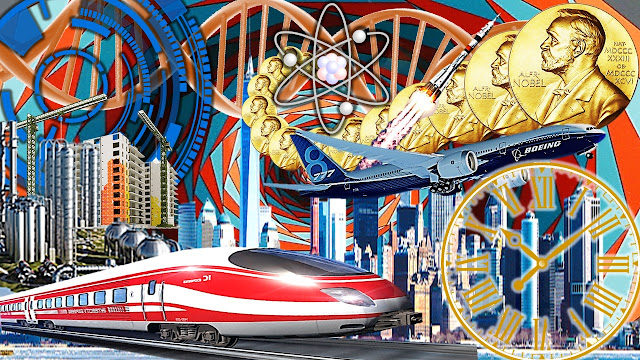Doctor
Doctoral programs (eng) / Докторские программы (rus)
1.
The doctoral programs of the Academy are systemically interconnected scientific and qualification assessment events, which are based on the stimulation of self-organization, self-development, creative initiative and activity of scientists, promotion of scientific papers and their wide consideration, organization of professional communications and deep and comprehensive expert and open public appraisal of the results of scientific studies conducted by scientists from around the world.
The doctoral programs of the Academy
are not the direct analogue of the academic doctoral programs offered by the
universities. They are not expected to substitute them or copy them in any
form.
The doctoral program is a form of
organization and development of effective scientific activity, which is
implemented in the course of its tracking, professional analysis and assessment
by the representatives of international scientific community - specialists from
around the world.
The doctoral qualifications, granted
to applicants after successful completion of the doctoral programs are first of
all the scientific degrees or titles, which reflect the high-level of
scientific activity, creative self-expression and progressiveness of ideas,
which are manifested through the significant list of original scientific papers
prepared by the specific scientists and published during a certain period of
time. The number of such scientific papers is fixed in the rules.
The mechanism of implementation of
doctoral programs is based on objectively the most effective and generally
accepted way to ensure the legitimacy of social processes. It includes:
- the democratic process of
involvement of representatives of the international scientific community in
making the legally significant decisions;
- the procedure of professional
assessment of studies by the highly qualified professionals from around the
world;
- professional and collective nature
of all decisions related to the implementation of the doctoral program;
- international nature of the
scientific process, connected with implementation of the doctoral programs,
which is manifested in participation of specialists from different countries
and scientific schools in this process;
- Mass publication, transparency,
general accessibility and objectivity of information about the doctoral
programs and mechanisms of their implementation.
These programs have both the
scientific and educational content because all kinds of scientific processes
actually assume the accumulation and analysis of theoretical and practical
information in order to build the new knowledge.
The scale and intensity of
participation of applicants in championships in scientific analytics predefine
the actual educational and scientific load of a doctoral program. Achievements
in championships in scientific analytics characterize the degree of completion
of the educational elements of the program by the applicant, the corresponding
level of the scientist’s competence, certain level of innovation reached by the
scientist in his or her studies, high collective appraisal of the studies by
the professional scientific community.
But the main task and the key
element of the programs is formation and development of innovations. The most
important question is the following: can the person formulate reasonable
original conclusions and ideas in his or her original scientific papers. This
will actually predefine the results of participation of such scientists in
championships in scientific analytics, and therefore in the doctoral programs.
In addition to the dynamic
scientific and analytical doctoral programs, which are the basic type of the
doctoral programs, the Academy is also offering the scientific and analytical
thesis-based and bibliographic programs. Both have their original features.
The system of doctoral degrees of
the Academy has six levels and allows the interested persons to gradually
improve their doctoral qualification. There is also a possibility to convert
the doctoral qualifications of a lower-level into the qualification of a higher
level. For example, if a person takes part in championships in scientific
analytics every year, such person can obtain two doctoral degrees of the same
level within his or her branch of science. These two similar degrees can be
converted by the scientist into one degree or the higher level.
Doctoral qualifications of the
Academy are formalized by the ordinary and the wall-mounted diplomas. All
qualifications related to the certification programs are formalized by the
Europass Diploma Supplement and the Europass Mobility.
You can receive more information
about the scientific and analytical doctoral programs from managers of the
Academy and the PLATONICK project.
2.
The dynamic doctoral programs of the IASHE
Dynamic programs assume that an
author must submit a significant number of original scientific papers for
expert assessment. Quantity and quality of these papers must allow the author
accumulate during the year a number of credits required to complete the
program (1 - first variant of the program). This specific amount of credits is indicated in the Special "Prize Regulations" of the Academy. Also, the program can be successfully implemented according to the rules of the Regulations "On the doctoral programs" (2 - second variant) or on condition that an applicant obtains the necessary average point for expert assessment of the totality of author's publications in the project (3 - third variant). Any variant of the program that is most acceptable for the applicant can be applied. All scientific papers submitted by the author in the framework
of the program must be related to the same scientific branch, but of course can
have different topics.
The bibliographic doctoral programs
Bibliographic scientific and analytical doctoral programs are qualification-related procedures of analysis and recognition of high scientific and educational competence of researchers, who can be characterized by significant activity in publication of their scientific studies, as well as the general productivity and efficiency of scientific creativity.
Bibliographic scientific and
analytical doctoral programs can have two different formats: the attestation or
certification format and the status format.
The thesis-based (dissertation) doctoral programs
Fundamental feature of the mechanism
of the thesis-based (dissertation) programs is that the scientific and
analytical work of the applicant is related to his or her thesis, which is to
be mandatorily reviewed by experts and published.
In the framework of this program its
participant must prepare original scientific papers and submit them for expert
assessment. Contents of these scientific papers must be directly related to the
thesis written by the corresponding researcher.
3.
The program is implemented in accordance with the special rules of the Academy. More detailed information about the program is published on the IASHE website. For additional advice and application for participation in the program, please contact the managers of the Academy.
The general principles for the implementation of the Academy's doctoral programs are set out in the special Regulations: No 1, No 2, No 3. If necessary (during the period of experiments or approbation of innovations), the IASHE has the right to introduce special (additional) rules for the implementation of such programs. Details of these circumstances can be obtained from the managers of the Academy.
1.
Докторские программы МАНВО – это системно взаимосвязанные научные, исследовательские и оценочно-квалификационные мероприятия, основанные на:
- стимулировании самоорганизации, саморазвития, творческой инициативы и активности ученых;
- обеспечении обнародования и широкого обсуждения результатов научных исследований;
- организации профессиональных коммуникаций и проведении высококвалифицированного экспертного и открытого общественного оценивания результатов научных изысканий ученых из разных стран мира.
Докторские программы МАНВО не являются прямым аналогом академических докторских программ университетов и не преследуют цель их подмены или копирования в какой-либо форме.
Докторские программы представляются собой форму организации и развития эффективной научно-исследовательской деятельности, которая реализуется в процессе её отслеживания, профессионального анализа и качественного оценивания представителями международной научной общественности – специалистами из разных стран мира.
Докторские квалификации, присваиваемые соискателям по итогам успешной реализации докторских программ, - это, прежде всего, научно-исследовательские степени (регалии), отражающие высокий уровень исследовательской активности, творческого самовыражения, прогрессивности и новаторства, выраженные в значительной совокупности (в количестве, соответствующем минимально допустимым квалификационным требованиям) авторских изысканий конкретного ученого, обнародованных в течение ограниченного периода времени.
Реализация докторских программ основывается на объективно наиболее эффективной и общепризнанной методике обеспечения легитимности социальных процессов, сочетающей в себе:
а) демократический процесс привлечения к принятию юридически значимых решений представителей международной научной общественности;
б) процедуру обеспечения высокого профессионального качества квалификационного оценивания, в которой участвуют специалисты высокого уровня из разных стран мира;
в) профессиональную коллегиальность принятия всех решений, связанных с процедурой реализации докторских программ;
г) международный уровень научного процесса, связанного с реализацией докторских программ, который выражен в репрезентативном участии в таком процессе специалистов, представляющих различные страны и научные школы;
д) массовое обнародование, прозрачность, общедоступность и объективность информации о докторских программах и процессах их реализации.
Эти программы, несомненно, имеют не только научно-исследовательское содержание, но и образовательное – поскольку любой научный процесс представляет собой накопление и анализ теоретических и практических сведений в целях формирования новых знаний.
Масштабы и интенсивность участия соискателя в первенствах по научной аналитике определяют фактическую образовательную и научно-исследовательскую нагрузку докторской программы. Достижения в первенствах по научной аналитике характеризуют: квалификационную степень усвоения соискателем образовательных элементов программы, соответствующий уровень компетенции ученого, достижение им значительного уровня новаторства в исследованиях, высокую коллегиальную оценку исследовательской деятельности со стороны профессионального научного сообщества.
Но ключевая задача и содержание программ – формирование и развитие научных инноваций. Именно формулирование в оригинальных исследованиях обоснованных инновационных выводов и тезисов предопределяют успешность участия их авторов в первенствах по научной аналитике и, как следствие, - в докторских программах.
Помимо научно-аналитических (динамических) докторских программ (которые являются базовым видом докторских программ), МАНВО реализует также научно аналитические диссертационные и библиографические программы, которые отличаются определенной спецификой.
Система докторских степеней МАНВО имеет 6 уровней и позволяет заинтересованным лицам постепенно повышать свою докторскую квалификацию. Также существует возможность конвертации докторских квалификаций низкого уровня в более высокую докторскую квалификацию. Ежегодно участвуя в первенствах по научной аналитике, автор, в принципе, может получить по своей специальности, например, две докторские степени одного уровня. Такие две одинаковые степени, ученый вправе конвертировать в одну степень более высокого уровня.
Докторские квалификации МАНВО оформляются основным и настенным дипломами, а также все квалификации по аттестационным программам оформляются «Europass Diploma Supplement» и «Europass Mobility».
Более подробную информацию о научно-аналитических докторских программах заинтересованные лица могут получить в администрации МАНВО и проекта PLATONICK.
Докторские динамические программы МАНВО
Динамические программы отличаются представлением автором к экспертному оцениванию значительного количества оригинальных авторских статей, количество и качество которых должны позволить автору в течение календарного года набрать необходимое для прохождения программы количество зачетных баллов (1 вариант прохождения программы). Такое количество баллов устанавливается специальным Призовым Регламентом МАНВО. Также программа может быть успешно реализована по правилам Регламента "О докторских программах" (2 вариант) или при условии получения соискателем необходимого среднего балла экспертного оценивания совокупности авторских публикаций в проекте (3 вариант). Может применяться любой наиболее приемлемый для соискателя вариант прохождения программы. Все статьи, представленные автором в рамках программы должны иметь единую отраслевую принадлежность, но могут отличаться тематически.
Библиографические
докторские программы
Библиографические научно-аналитические докторские программы –
это квалификационные процедуры оценки и признания высокой
научно-образовательной компетенции исследователей, которые отличаются
значительной активностью в обнародовании своих авторских изысканий, а также
общей продуктивностью и эффективностью научного творчества.
Библиографические научно-аналитические докторские программы,
могут иметь аттестационный и статусный форматы.
Принципиальная особенность механизма реализации диссертационных программ – привязанность научно-аналитической деятельности соискателя к его тематической диссертационной работе, подлежащей обязательному экспертному рецензированию и опубликованию.
В рамках данной программы её участник подготавливает и представляет к экспертному оцениванию оригинальные авторские статьи, содержание которых непосредственно связано с базовым диссертационным исследованием.
3.
Программа реализуется в соответствии со специальными правилами Академии. Более подробная информация о программе опубликована на сайте МАНВО. Для получения дополнительных консультаций и подачи заявки на участие в программе обращайтесь, пожалуйста, к менеджерам Академии.
Общие принципы реализации докторских программ Академии изложены в специальных Положениях: №1, №2,№3. При необходимости (в период проведения экспериментов или апробации нововведений) МАНВО вправе вводить специальные (дополнительные) правила реализации таких программ. Подробности этих обстоятельств можно узнать у менеджеров Академии.
ДОПОЛНИТЕЛЬНАЯ ИНФОРМАЦИЯ НА САЙТЕ IASHE
#IASHE, #education, #МАНВО, #образование, #наука, #science, #PhD, #doctoralprograms, #докторскиепрограммы, #докторнаук, #doctorofscience





Comments
Post a Comment
Please formulate an objective and correct comment.